How Does AI in Medical Diagnosis Expedite It?
With a 96% accuracy rate, an AI algorithm could detect breast cancer on mammograms. Large volumes of patient data, including EHRs, are also being analyzed by clinical decision support system software solutions to find patterns and trends that can help with diagnosis and treatment choices.
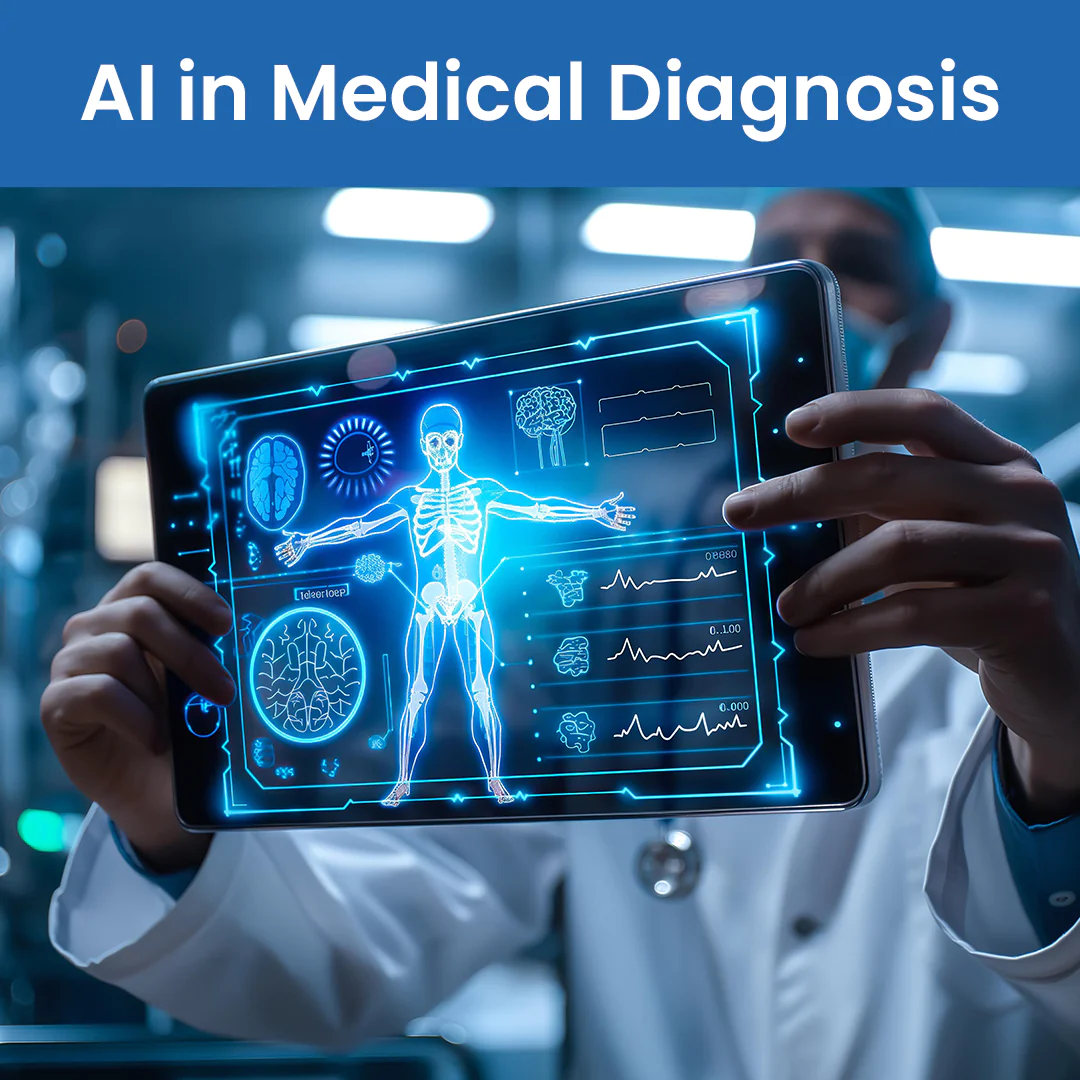
Facing Diagnostic Delays? Implement Our Developed AI Software Solutions to Expedite Medical Diagnosis and Improve Outcomes
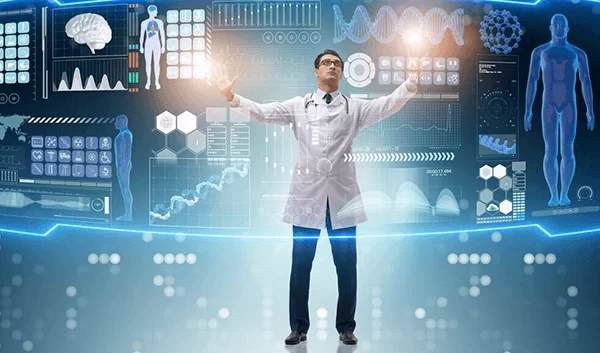
“AI algorithms can analyze medical images (e.g., X-rays, MRIs, ultrasounds, CT scans, and DXAs) and assist healthcare providers in identifying and diagnosing diseases more accurately and quickly. AI can analyze copious amounts of patient data, including medical 2D/3D imaging, bio-signals (e.g., ECG, EEG, EMG, and EHR), vital signs (e.g., body temperature, pulse rate, respiration rate, and blood pressure), demographic information, medical history, and laboratory test results.”- NCBI
How AI in Medical Diagnosis Works?
The ability of AI to replicate human intellect, aided by enormous processing power and speed, accounts for its proficiency in medical diagnosis. It uses machine learning methods, particularly deep learning, to learn from large medical datasets, such as pictures, documents, and guidelines. These algorithms are quite good at finding patterns in medical data, identifying abnormalities in photos, and connecting symptoms to illnesses. Numerous medical specialties, including radiology, pathology, cardiology, and dermatology, have used AI.
- AI is quite good at accurately identifying vascular abnormalities, malignancies, and fractures in radiological imaging.
- It helps pathologists detect malignant cells, and cardiologists use it to estimate the risk of heart disease.
- AI is used by dermatologists to identify skin disorders in images.
- Applications in neurology, gastrointestinal, and ophthalmology demonstrate AI’s broad medical promise.
Furthermore, algorithmic biases, informed consent requirements, and patient data privacy are ethical issues brought up by AI in customized medicine. Maintaining the caliber and integrity of personalized medical procedures depends on a cordial working relationship between AI and healthcare professionals. A key factor is the caliber and diversity of training data. Diverse datasets and constant algorithm improvement are necessary to guarantee accurate and reliable AI performance.
Role of AI in Medical Diagnosis
- Personalized Medicine: AI creates more individualized and efficient care regimens by customizing therapies based on patient data.
- Efficiency: Healthcare professionals can concentrate on patient care as automated systems expedite the diagnosis procedure.
- Early Detection: Timely intervention is made possible by the ability of machine learning algorithms to detect early indicators of conditions like cancer or heart disease.
The use of AI in medical diagnosis has numerous benefits.
- Specifically, AI can handle copious amounts of data rapidly, which could lead to earlier and more precise diagnoses. Naturally, this can result in better patient outcomes and, in some situations, a greater chance of a successful course of therapy.
- Additionally, AI expedites the diagnostic procedure by lowering the time and effort needed for interpretation and analysis. In healthcare systems, this efficiency results in lower costs, higher patient throughput, and more efficient use of available resources.
- Furthermore, by providing recommendations for diagnosis and therapy based on the most recent medical information, AI can serve as a useful decision-support tool for medical personnel.
What are the Challenges of AI in Medical Diagnosis?
The number of artificial intelligence applications in medicine has skyrocketed in recent years. Nevertheless, despite their increasing numbers, healthcare organizations using AI to assist in medical diagnosis encounter several challenges:
- Ensure confidentiality and secure data storage through advanced encryption protocols and compliance with regulations (e.g., GDPR, HIPAA).
- Demonstrate the reliability of AI solutions by conducting clinical studies and obtaining regulatory approvals (CE or FDA marking).
- Enable seamless data interoperability to integrate smoothly into healthcare practitioners’ workflows and existing systems.
- Develop viable business models, considering reimbursement options by health insurance providers to support long-term adoption.
- Quantify the benefits of AI through operational impact studies, showing reductions in treatment time, cost, and improved patient outcomes.
Early Diagnostics Using Clinical and Molecular Data
7 Ways AI in Medical Diagnosis Expedite It
AI is revolutionizing the conventional medical diagnostic process and assisting healthcare providers in increasing the precision and effectiveness of their diagnoses by utilizing machine learning algorithms and natural language processing. Here, we’ll look at the top 7 ways AI is speeding up medical diagnostics and how it could completely transform the healthcare sector.
 1. Image Analysis
1. Image Analysis
AI isn’t just for the future; it’s already having a significant impact on healthcare. Clinical teams are using AI-based image analysis to help them find diseases, injuries, and other anomalies in medical imaging like CT, MRI, and X-rays. AI’s deep learning capabilities enable it to identify minute details in scans, verifying incredibly complicated patterns. Artificial intelligence is improving the speed, accuracy, and affordability of medical diagnosis.
In CT imaging, automatic positioning and centering involves using AI algorithms to precisely position and center the patient within the CT scanner. This is crucial because perfect placement and centering ensure that the best quality and most accurate information is captured in the images. The CT machine uses image analysis algorithms to locate the patient’s anatomy in AI-based autonomous positioning and centering. To establish the proper position, the algorithms consider patient data and information from prior scans. They can also consider any movement or modifications to the patient’s anatomy. The time and manual efforts needed for accurate positioning and centering can be decreased using this method, improving the effectiveness and efficiency of the imaging process.
2. Diagnostic Decision Support
AI can give medical practitioners information to support diagnostics, including differential diagnosis and the probability of a problem existing. This implies that AI medical diagnosis can significantly improve patient diagnostic efficiency and accuracy. The potent powers of AI may even aid in the diagnosis of difficult cases and lower the number of incorrect diagnoses.
Healthcare practitioners can use clinical decision support systems (CDSS), a sort of DSS, to help them make clinical decisions. It can enhance the standard of care and patient outcomes by giving clinical decision-makers access to real-time, patient-specific data. AI could increase the precision and effectiveness of CDSS. According to an NCBI study, an AI-powered CDSS cut the average time needed to identify a particular disease from 6 minutes to just 36 seconds. Furthermore, compared to conventional decision-making techniques, AI-powered CDSSs have been shown to lower the cost of care for specific disorders.
3. Virtual Biopsies
By substituting “virtual biopsies” for conventional tissue samples, AI for medical diagnosis is revolutionizing diagnostics by enabling physicians to identify genetic and tumor characteristics without invasive procedures. AI can offer comprehensive insights into the characteristics of a tumor by using advanced algorithms and imaging techniques. This non-invasive method lowers the dangers and inconvenience of surgical biopsies for patients.
Virtual biopsies provide more frequent tracking of the progression of tumors, which is essential for customizing treatment regimens, in addition to expediting the diagnostic procedure. By detecting changes in tumor behavior early, this method can improve patient outcomes and increase the efficacy of treatment.
4. Improving Clinical Trials
Clinical trials are being transformed by AI because it improves diagnostic precision and lowers error rates. AI clinical decision support system software solutions can examine complicated facts and find patterns and anomalies that conventional approaches would overlook by utilizing deep learning. This ensures more accurate and dependable diagnosis and increases the effectiveness of disease detection.
AI’s vital role in improving medical diagnostics and improving patient outcomes is highlighted by its incorporation into clinical trials.
5. Disease Classification
AI plays a crucial role in computer-aided diagnosis (CAD), image-based disease classification, and segmentation by leveraging advanced deep-learning techniques. These AI algorithms are designed to analyze medical images, such as MRIs, CT scans, and X-rays, to identify complex patterns that may not be immediately visible to the human eye. This allows physicians to diagnose illnesses more quickly and with higher accuracy. By continuously learning from new datasets, AI systems enhance their predictive accuracy over time, refining their ability to detect anomalies and classify diseases with greater precision.
Deep learning models, such as CNNs, are particularly effective in recognizing subtle patterns in image data, enabling early detection of conditions like cancer, neurological disorders, and cardiovascular diseases. As these algorithms evolve, they not only improve diagnostic speed but also reduce the likelihood of human error, improving overall patient outcomes.
6. Infectious Outbreaks & Risk Prediction
Infectious outbreaks can be accurately predicted by AI in medical diagnostics. Substantial amounts of publicly available data can be quickly analyzed by complex AI algorithms, giving epidemiologists a better ability to monitor the development and spread of infectious diseases.
To help improve patient experiences, AI can also be utilized to develop algorithms that predict hazards to one’s own and the community’s health. In the medical field, doctors at the University of Pennsylvania developed a machine learning algorithm that can monitor hundreds of critical attributes in real-time to detect sepsis or septic shock in patients 12 hours before symptoms appear. It can be fully utilized and is among the most impressive applications of AI in medical diagnosis.
7. Reducing False Positives & Negatives
Convolutional neural networks, one type of deep learning algorithm, are essential for increasing diagnostic accuracy since they minimize human error and oversight. By speeding up the analysis of medical testing, these algorithms can produce forecasts that are more precise and timelier. For example, it has been demonstrated that AI-based technologies, such as CNN-LSTM architectures, improve diagnostic process efficiency by reducing erroneous readings. In medical diagnostics, GANs are another type of deep learning model that can drastically lower false positives and negatives. In other words, GANs reduce the likelihood of errors, which improves medical outcomes and makes diagnoses more trustworthy for the patient.
Algorithms with long short-term memory (LSTM) are smart assistants that assist physicians by gradually recalling crucial information. To ensure the diagnosis is as accurate as possible, they thoroughly review medical data to prevent errors. As a result, patients will receive better treatment and fewer mistakes. Because LSTM networks excel at processing sequential data, they are great for evaluating time-series data from patient records, including tracking the development of chronic conditions or monitoring vital signs.
Improve Patient Care by Reducing Diagnostic Times with Our Advanced AI-Powered Diagnostic Software Development Services
Predictions for the Future of AI in Medical Diagnostics
The medical field is about to undergo a revolution because of AI diagnosis. The following are some forecasts for AI diagnostics in the future:
- AI will significantly reduce diagnosis times, enabling quicker medical interventions and treatment planning.
- As technology advances, the costs of AI diagnostics will decrease, making them more accessible across healthcare systems.
- AI will enhance decision-making for both doctors and patients by providing more accurate data-driven insights for treatment options.
- The accuracy of AI in diagnosing diseases will continue to improve with ongoing learning from larger datasets.
- AI diagnostics will become more prevalent in both primary care and specialized medical fields, transforming healthcare practices broadly.
Wrapping Up
The diagnostics sector is transforming because of AI algorithms that increase accuracy and speed up results. This technology gives us vital information about medical issues and has amazing potential in many other areas of healthcare. At NextGen Invent, our Artificial Intelligence software development services are designed to expedite diagnoses, enhance decision-making, and streamline healthcare workflows. Even though there are still certain obstacles to be addressed, it is obvious that AI-powered solutions will play a significant role in diagnostic testing in the future. Our healthcare system will depend increasingly on this technology as it develops further, giving doctors the much-needed support they need to make precise, timely, and effective diagnoses.
Contact us today to learn how we can help you implement innovative AI solutions that bring speed and accuracy to your medical practice. Reach out to our experts and start transforming your healthcare delivery!
Frequently Asked Questions About AI in Medical Diagnosis
Related Blogs
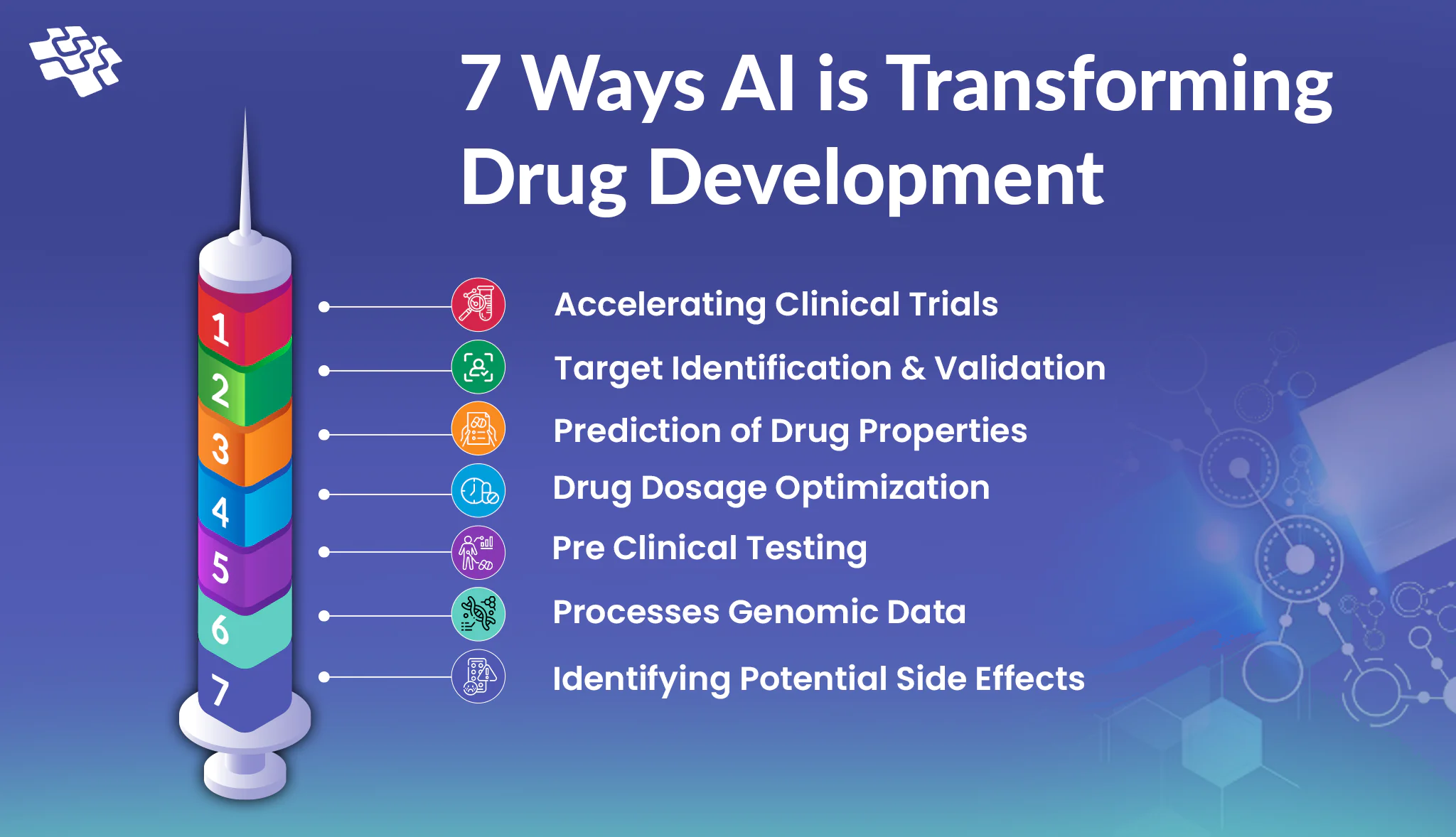
How AI in Drug Development is Transforming the Industry?
When trying to make an appointment for a medical visit, have you ever found that you have to wait weeks for the next open time slot? Everyone has experienced that. Mobile apps, however, have completely changed how we make appointments...
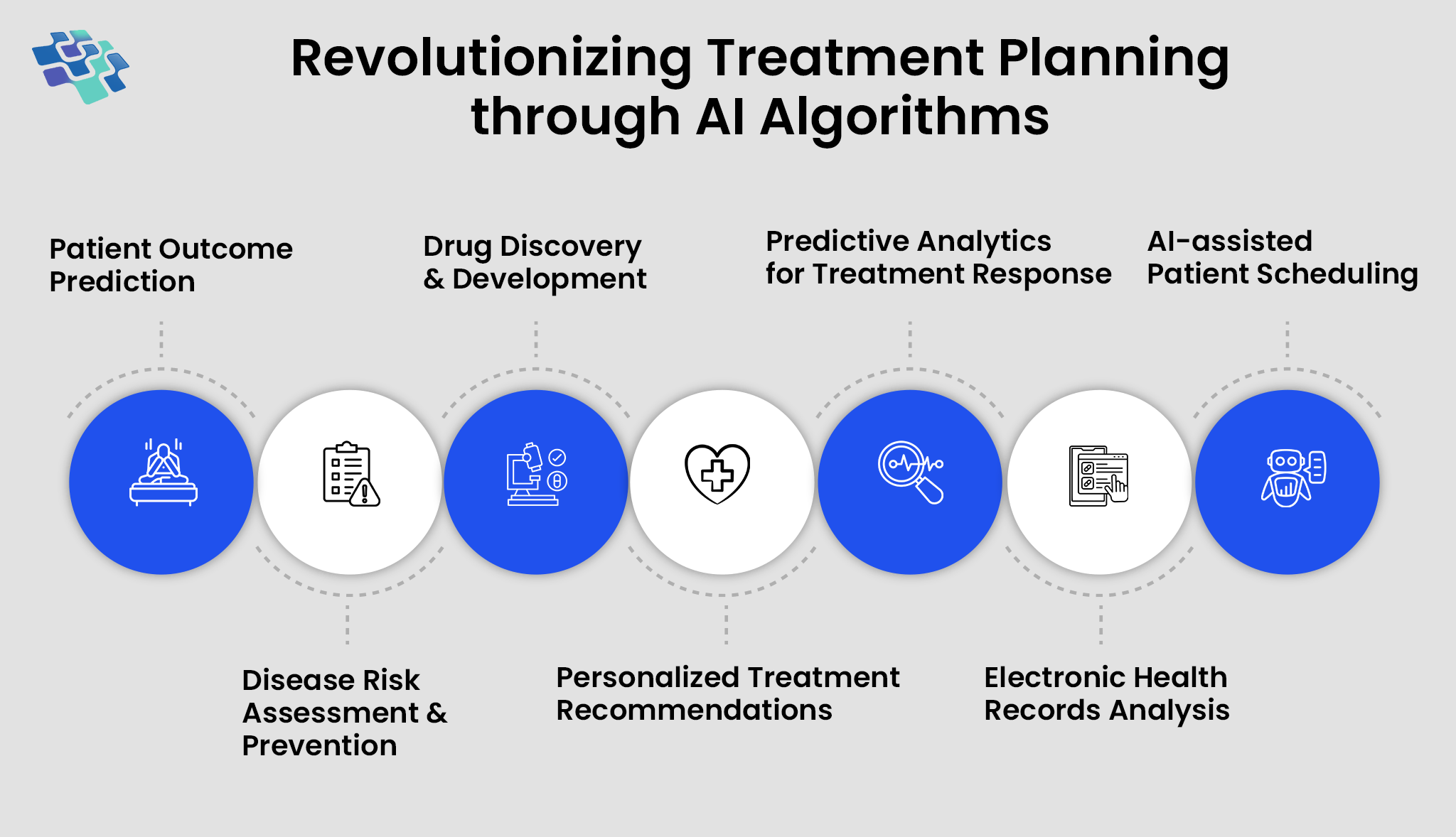
The Role of AI in Personalized Healthcare
What the American Medical Association refers to as AI’s “augmented intelligence” role is improving healthcare through better diagnostics, tailored medication, patient involvement, and dismantling data silos to transform patient care...
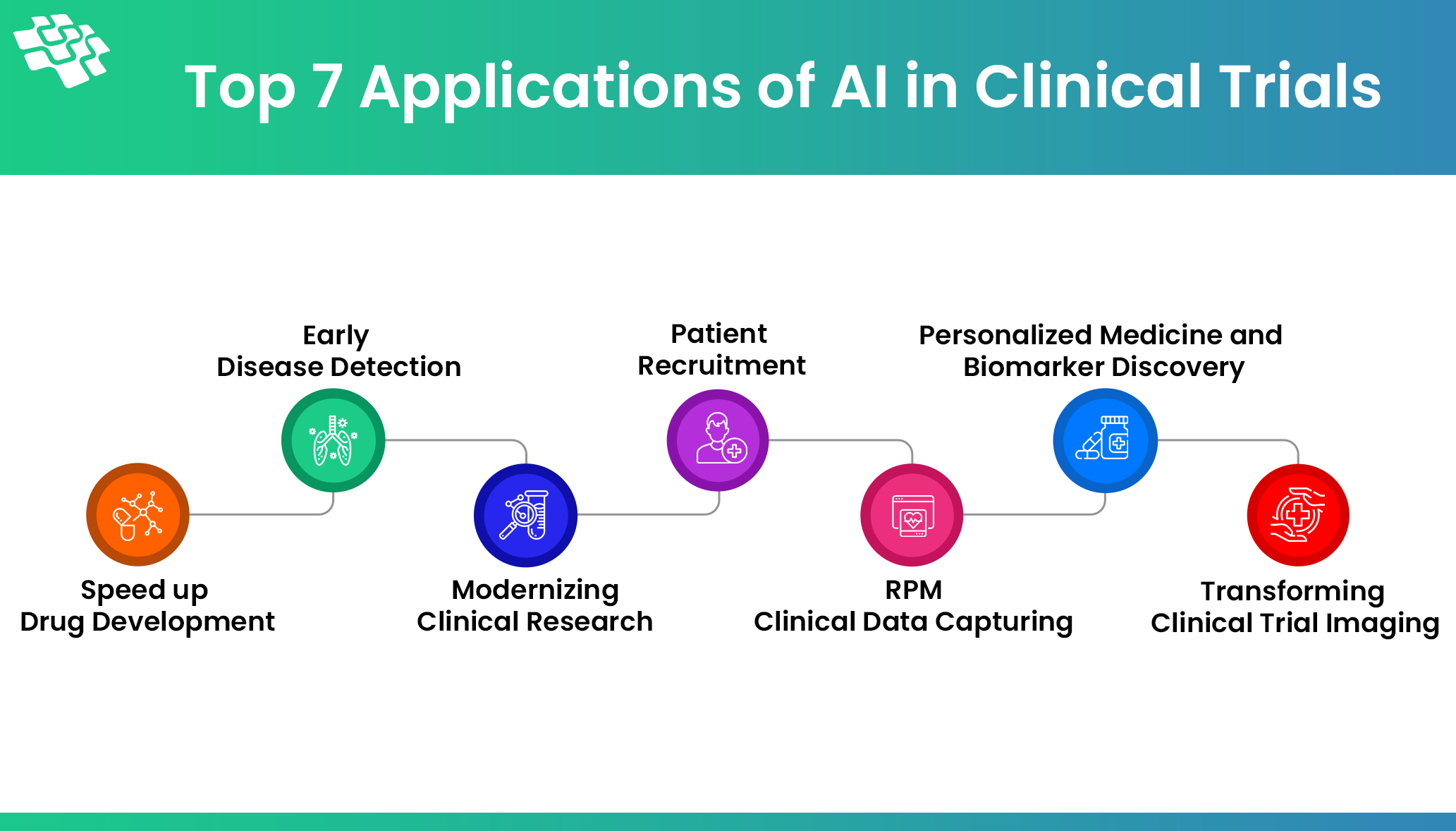
How AI in Clinical Trials is Improving Patient Outcomes?
The past year has seen a lot of coverage of AI because of its potential applications in business, logistics, technology, healthcare, and other fields. What about clinical research, though? Sponsors and clinical researchers should anticipate using AI in clinical trials.
Stay In the Know
Get Latest updates and industry insights every month.
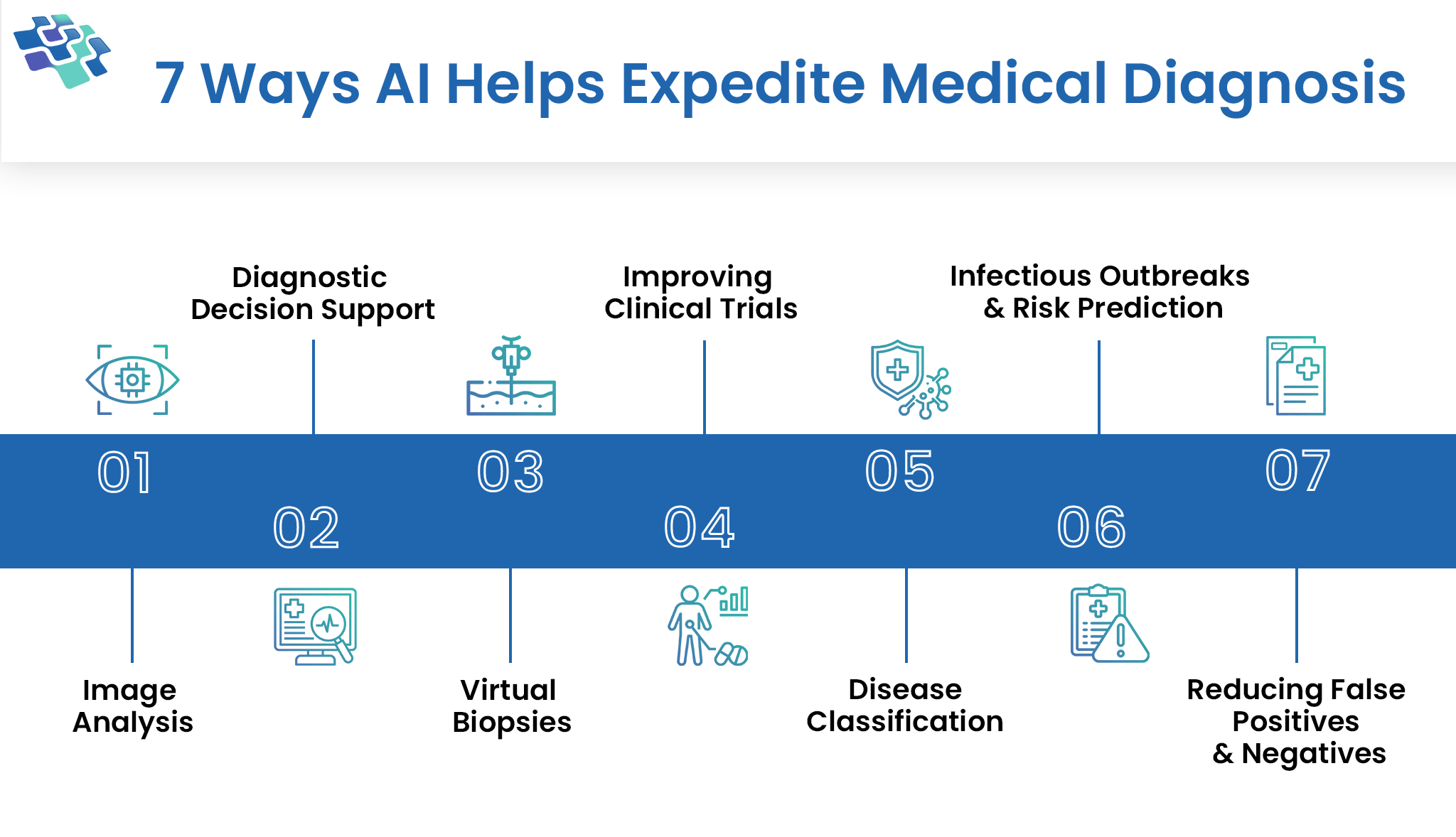 1. Image Analysis
1. Image Analysis